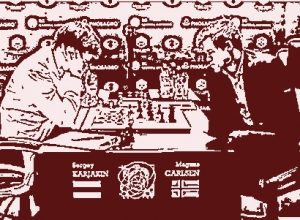 The character of the world chess championship match between world champion Magnus Carlsen and his challenger Sergey Karjakin has changed: while they were testing each other’s (and the viewers’) patience in games 1 and 2, just waiting for the other side to make a mistake that never happened, the next two games were characterized by a fierce and long fight.
The character of the world chess championship match between world champion Magnus Carlsen and his challenger Sergey Karjakin has changed: while they were testing each other’s (and the viewers’) patience in games 1 and 2, just waiting for the other side to make a mistake that never happened, the next two games were characterized by a fierce and long fight.
In games 3 and 4, Carlsen put Karjakin under heavy pressure in the endgame, the final phase of a chess game, where the number of pieces on the board is reduced. Usually, Carlsen’s opponents crack under the pressure of the world champion’s almost perfect skills in converting small endgame advantages. Not so Karjakin: in both games he successfully defended inferior positions and achieved two draws against Carlsen. Commentators rightly praised Karjakin’s defensive skills. Some even jokingly suggested that the challenger should become Russia’s defense minister.
Business lesson
Karjakin’s resilience sets an example for executives and entrepreneurs who face adversity in business. How did Karjakin develop his resilience, and how could you transfer this to the business world?
At the root is willpower, as I explained in my German book on the seven success principles of chess masters. The good news is that you can strengthen your willpower by managing your energy level, attitude and habits. In order to be as resilient as Karjakin, a strong belief in yourself and your resources is crucial. That belief will be strengthened through experience. Before the match against Carlsen, Karjakin had already successfully defended hundreds of difficult chess positions against other world class players.
However, that is not enough. You also need to regulate your emotions, replacing destructive feelings of despair in view of seemingly insurmountable difficulties with a constructive ‘can do’-attitude that enables you to find the hidden resources in a difficult situation. Please do not confuse this with blind optimism. In order to find the hidden resources, Karjakin had to be brutally honest with himself about the situation he was in. A realistic evaluation of the situation is the basis for being purposefully resilient.
